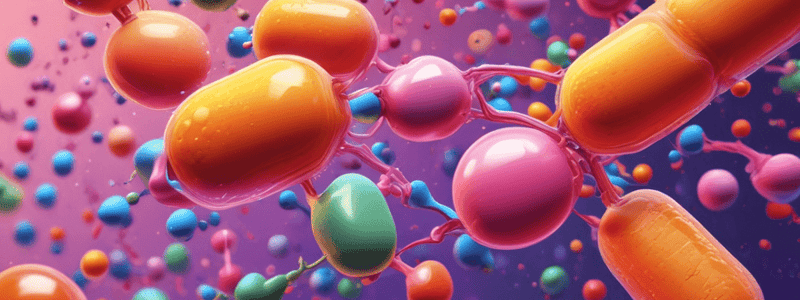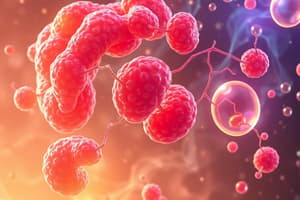Podcast
Questions and Answers
Which best describes the type of fatty acid found on carbon 2 of a TAG?
Which best describes the type of fatty acid found on carbon 2 of a TAG?
- Saturated or unsaturated
- Unsaturated (correct)
- Saturated
- Partially saturated
What effect does the presence of unsaturated fatty acids have on the Tm of lipids?
What effect does the presence of unsaturated fatty acids have on the Tm of lipids?
- Depends on the length of the FA chain
- Increases it
- Decreases it (correct)
- No effect
What stimulates the mobilization of fat from adipocytes?
What stimulates the mobilization of fat from adipocytes?
- Insulin
- Cortisol
- Epinephrine and glucagon (correct)
- Leptin
Where is Carnitine primarily synthesized in the body?
Where is Carnitine primarily synthesized in the body?
How can Carnitine be obtained besides its synthesis in the body?
How can Carnitine be obtained besides its synthesis in the body?
What can Carnitine deficiency lead to in tissues?
What can Carnitine deficiency lead to in tissues?
Why are lipids considered more efficient for storage compared to carbohydrates and proteins?
Why are lipids considered more efficient for storage compared to carbohydrates and proteins?
What type of lipids are stored as liquid droplets in adipocytes?
What type of lipids are stored as liquid droplets in adipocytes?
What is the fate of mitochondrial Acetyl-CoA in de novo fatty acid synthesis?
What is the fate of mitochondrial Acetyl-CoA in de novo fatty acid synthesis?
Which enzyme catalyzes the conversion of Acetyl-CoA to Malonyl CoA in de novo fatty acid synthesis?
Which enzyme catalyzes the conversion of Acetyl-CoA to Malonyl CoA in de novo fatty acid synthesis?
What stimulates the synthesis of Acetyl-CoA carboxylase (ACC) in de novo fatty acid synthesis?
What stimulates the synthesis of Acetyl-CoA carboxylase (ACC) in de novo fatty acid synthesis?
What is biotin (Vit H or B7) required for?
What is biotin (Vit H or B7) required for?
What triggers a high energy signal to be produced in the de novo fatty acid synthesis pathway?
What triggers a high energy signal to be produced in the de novo fatty acid synthesis pathway?
Where does the de novo synthesis of fatty acids primarily occur?
Where does the de novo synthesis of fatty acids primarily occur?
What is required for de novo synthesis of fatty acids?
What is required for de novo synthesis of fatty acids?
Which organelle is essential for providing Acetyl Coenzyme A (ACoA) for de novo synthesis of fatty acids?
Which organelle is essential for providing Acetyl Coenzyme A (ACoA) for de novo synthesis of fatty acids?
What is the primary end product of de novo synthesis of fatty acids?
What is the primary end product of de novo synthesis of fatty acids?
Which type of fatty acid can the brain produce for the synthesis of brain phospholipids?
Which type of fatty acid can the brain produce for the synthesis of brain phospholipids?
What happens when physiological conditions promote fatty acid synthesis?
What happens when physiological conditions promote fatty acid synthesis?
Which tissues can synthesize fatty acids in small quantities?
Which tissues can synthesize fatty acids in small quantities?
What is the role of smooth ER in fatty acid metabolism?
What is the role of smooth ER in fatty acid metabolism?
Which molecule is required to transport fatty acyl CoA into the mitochondria?
Which molecule is required to transport fatty acyl CoA into the mitochondria?
What inhibits the carnitine shuttle (CPT1) from transferring newly synthesized fatty acids to the mitochondria?
What inhibits the carnitine shuttle (CPT1) from transferring newly synthesized fatty acids to the mitochondria?
In beta oxidation, what is the rate-limiting step for transporting fatty acyl CoA into the mitochondria?
In beta oxidation, what is the rate-limiting step for transporting fatty acyl CoA into the mitochondria?
Which of the following is NOT produced during each cycle of beta oxidation?
Which of the following is NOT produced during each cycle of beta oxidation?
What is the main catabolism pathway for fatty acids?
What is the main catabolism pathway for fatty acids?
What is the end product of oxidizing 1 palmitoyl CoA?
What is the end product of oxidizing 1 palmitoyl CoA?
Which four reactions are involved in the first cycle of beta oxidation that shortens a fatty acid by 2 carbons?
Which four reactions are involved in the first cycle of beta oxidation that shortens a fatty acid by 2 carbons?
What stimulates the production of ketone bodies in the liver?
What stimulates the production of ketone bodies in the liver?
Why can't mammalian RBC and liver use ketones as an energy source?
Why can't mammalian RBC and liver use ketones as an energy source?
What is the main function of ketone bodies during episodes of fasting?
What is the main function of ketone bodies during episodes of fasting?
During fasting, what triggers the increase in ketone body production in the liver?
During fasting, what triggers the increase in ketone body production in the liver?
What is one reason why ketones cannot be used as an energy source by hepatocytes?
What is one reason why ketones cannot be used as an energy source by hepatocytes?
What is the first step of ketolysis?
What is the first step of ketolysis?
Study Notes
Lipid Storage
- Lipids are stored as triacylglycerol (TAG) molecules, consisting of three fatty acids.
- Fatty acids in TAG are generally not identical.
- Carbon 1 is often saturated, carbon 2 is unsaturated, and carbon 3 can be either saturated or unsaturated.
- Unsaturated fatty acids lower the melting point (Tm) of lipids.
- Lipids can be stored as mono-, di-, or triacylglycerol.
- Lipid caloric mass is over twice that of carbohydrates and proteins, making them more efficient for energy storage.
Lipid Mobilization
- Lipids are stored as liquid droplets in adipocytes.
- A small amount of lipids are stored in the liver and released into the blood as VLDL.
- Mobilization of fat from adipocytes requires release from TAG form via lipolysis, with the help of hormone-sensitive lipase (HSL).
- Lipolysis is stimulated by epinephrine and glucagon.
Carnitine and Fatty Acid Beta Oxidation
- Carnitine is a compound synthesized by methionine and lysine amino acids in the liver and kidneys.
- Carnitine deficiency can cause decreased ability of tissues to use long-chain fatty acids (LCFA) for energy.
- Carnitine deficiency can be due to cellular defects, genetic or medical conditions, or liver or kidney pathologies.
De Novo Synthesis of Fatty Acids
- Step 1: Cytosolic acetyl-CoA production involves mitochondrial ACoA production, citrate formation, and ATP-citrate lyase.
- Step 2: ACoA carboxylation to malonyl-CoA is catalyzed by acetyl-CoA carboxylase (ACC), which is allosterically activated by citrate and inactivated by palmitoyl-CoA.
- Step 3: Synthesis of palmitate (16:0) involves the addition of 2 carbons from malonyl-CoA to the carboxyl end of acyl acceptors.
Fatty Acid Metabolism
- Fatty acid synthesis normally occurs in the cytosol of adipocytes, hepatocytes, and mammary glands.
- Short fatty acids are specifically produced in the mammary glands.
- The kidney, brain, and lungs can synthesize FA in small quantities.
- Animals can synthesize all fatty acids they need, except for essential fatty acids.
- De novo synthesis of fatty acids requires ATP and NADPH.
Fatty Acid Beta Oxidation
- Beta oxidation is the major catabolism pathway for fatty acids and takes place in the mitochondria.
- LCFA must form an active intermediate (fatty acyl-CoA) before being oxidized in the mitochondria.
- The carnitine shuttle is required to transport fatty acyl-CoA into the mitochondria.
- Each cycle of beta oxidation produces 1 acetyl-CoA, 1 NADH, and 1 FADH2.
Ketones
- Ketones are produced during high-fat diet, fasting, or prolonged exercise.
- Ketones are used proportionally to their concentration in the blood by extrahepatic tissue.
- Ketones can be used by the cardiac and skeletal muscle, intestinal mucosa cells, renal cortex, brain, and even by a fetus.
- Ketones' major function is to save glucose during episodes of fasting and prolonged exercise.
Studying That Suits You
Use AI to generate personalized quizzes and flashcards to suit your learning preferences.
Related Documents
Description
Test your knowledge of the synthesis and oxidation of fatty acids as part of lipid metabolism. Learn about the physiological conditions that regulate fatty acid synthesis and oxidation, and how this process prevents futile recycling in cells.




